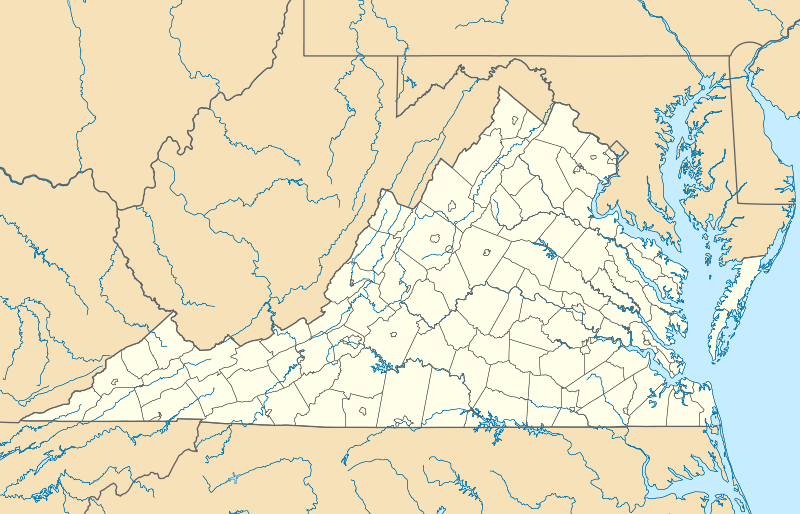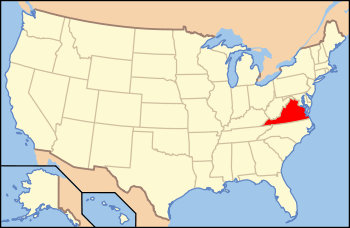Virginia Episcopal School
| Virginia Episcopal School | |
|---|---|
| Address | |
|
400 VES Road Lynchburg, VA 24503 United States | |
| Coordinates | 37°27′9.5″N 79°11′26.5″W / 37.452639°N 79.190694°WCoordinates: 37°27′9.5″N 79°11′26.5″W / 37.452639°N 79.190694°W |
| Information | |
| Type | Private Preparatory Boarding School |
| Motto | Toward Full Stature |
| Religious affiliation(s) | Episcopalian |
| Established | 1916 |
| Headmaster | Mr.G.Thomas Battle, Jr. '83 |
| Faculty | 40 |
| Grades | 9-12 |
| Enrollment | 245 |
| Average class size | 12 |
| Student to teacher ratio | 6:1 |
| Campus | Suburban - 160 acres (0.65 km2) |
| Color(s) | Garnet & White |
| Athletics | 19 interscholastic |
| Athletics conference |
VIC (Boys) BRC (Girls) |
| Mascot | The Fighting Bishops |
| Website | |
|
Virginia Episcopal School | |
  | |
| Location | 400 Virginia Episcopal School Rd., Lynchburg, Virginia |
| Area | 160 acres (65 ha) |
| Built | 1916 |
| Architect | Brooke, Frederick H. |
| Architectural style | Colonial Revival, Georgian Revival |
| NRHP Reference # | 92001392[1] |
| VLR # | 118-0224 |
| Significant dates | |
| Added to NRHP | October 28, 1992 |
| Designated VLR | June 17, 1992[2] |
Virginia Episcopal School is a college preparatory school located in Lynchburg, Virginia, United States. The school was first conceived in 1906 by the Reverend Robert Carter Jett. After many years of tireless work by Jett and others, the school opened its doors to students in September 1916. By design, VES is a coeducational day and boarding community of approximately 245 students representing 20 states and countries. Virginia Episcopal School's 160-acre (0.65 km2) campus is located above the James River in Lynchburg along the foothills of the Blue Ridge Mountains.
History
By design, VES is a small, independent school with an engaging academic community of students and residential faculty.

The school was first conceived in 1906 by Reverend Robert Carter Jett and opened its doors to students in September 1916.
Dr. Jett conceived the first buildings on the VES campus while riding a train in Raleigh, North Carolina. There, he drew his architectural view of the campus on the back of an envelope. Main Hall (today's Jett Hall), which opened in September 1916, is based on these drawings. In 1919 Langhorne Memorial Chapel, which was made possible by a gift from Chiswell Dabney Langhorne in memory of his wife Nancy Witcher Keene (parents of Lady Astor), was consecrated. This was followed by the opening in 1920 of Barksdale Gymnasium, which is rumored to be based on the measurements of King Solomon's temple in Jerusalem.[3]
The School Today
The campus today includes a modern athletics complex, classroom buildings, residence halls, and the William King Center for Arts & Leadership. The student body has grown from 60 boys to approximately 245 young men and women from 20 states and countries. Over two-thirds of VES's student body live on campus. Recent VES graduates have been accepted at some of the finest colleges and universities in the world, including Bard College, Boston College, Brown University, Carnegie Mellon University, The College of William & Mary, Columbia University, Cornell University, Dartmouth College, Davidson College, Duke University, Elon University, Emory University, Georgia Institute of Technology, Georgetown University, Harvard University, Johns Hopkins University, Middlebury College, New York University, North Carolina State University, Parsons School of Design, Princeton University, Rice University, Sewanee: The University of the South, Stanford University, The University of St Andrews, United States Naval Academy, University of California, Berkeley, University of California, Los Angeles, University of Chicago, University of Illinois at Urbana-Champaign, University of Michigan, University of North Carolina at Chapel Hill, University of Pennsylvania, University of South Carolina at Columbia, University of Southern California, University of Virginia, Vanderbilt University, Wake Forest University, Washington and Lee University, Washington University in St. Louis, Wofford College and Yale University.
Notable alumni
- Erskine Bowles - Former Chief of Staff under President Clinton
- Godfrey Cheshire III - Movie Critic and Filmmaker
- Steve Cowper - Former Governor of Alaska
- Hardy Cross Dillard - Former Judge of the International Court of Justice
- William B. Harrison, Jr. - Former CEO of J.P. Morgan Chase
- D. Holmes Morton - Physician
- Paul Taylor - Choreographer
- Robert Miskimon - Novelist, poet
- Vivian Howard - Owner, Chef & Farmer restaurant, James Beard Best Chef Southeast Semi-finalist 2011, 2012, 2013, 2014, 2015, Star of PBS documentary and cooking series "A Chef's Life"
- Roland Vaughan Mayor, Edenton, NC
- Paul Fulton Former president of Sara Lee Corp., chair of Bassett Furniture Industries and dean of the University of North Carolina’s Kenan-Flagler Business School
References
- ↑ National Park Service (2010-07-09). "National Register Information System". National Register of Historic Places. National Park Service.
- ↑ "Virginia Landmarks Register". Virginia Department of Historic Resources. Retrieved 19 March 2013.
- ↑ Calder Loth (March 1992). "National Register of Historic Places Inventory/Nomination: Virginia Episcopal School" (PDF). Virginia Department of Historic Resources. and Accompanying photo

